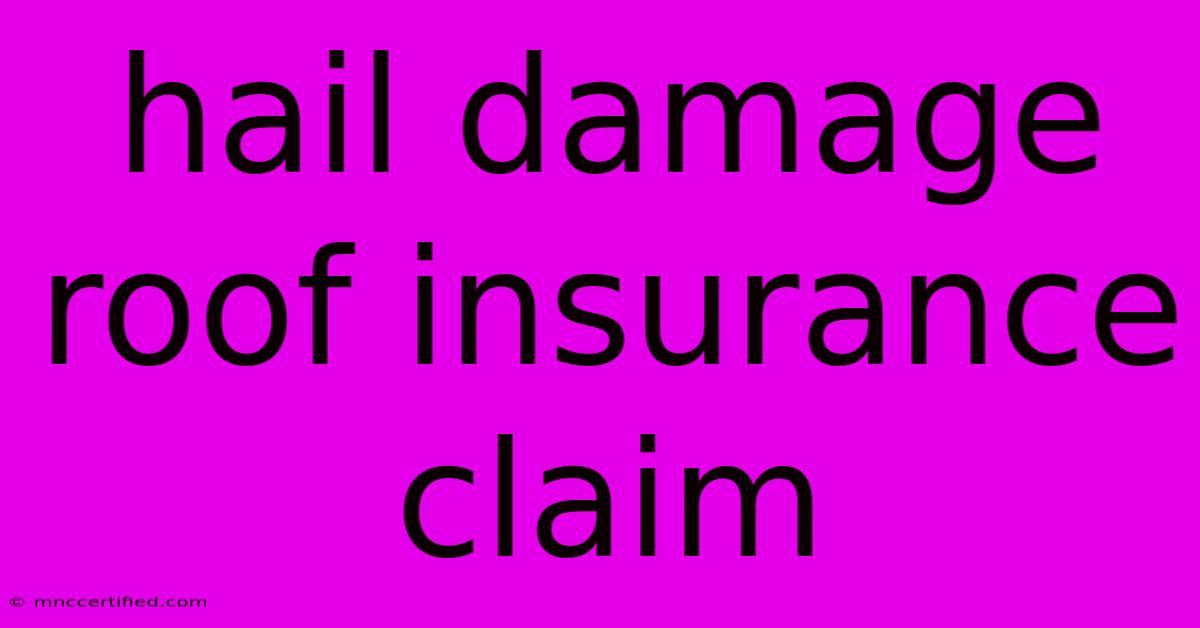Hail Damage Roof Insurance Claim

Table of Contents
Hail Damage Roof Insurance Claim: A Comprehensive Guide
Dealing with hail damage to your roof can be stressful, but understanding the insurance claim process can significantly ease the burden. This comprehensive guide will walk you through every step, from initial assessment to final settlement, ensuring you receive the compensation you deserve.
Understanding Your Coverage
Before you even think about filing a claim, carefully review your homeowner's insurance policy. Look for sections covering "hail damage," "wind damage," and "acts of God." Understanding your policy's deductibles, coverage limits, and any exclusions is crucial. Many policies cover hail damage as part of comprehensive coverage, but specifics vary by insurer and policy. Note down your policy number and contact information for your insurance provider.
Identifying Hail Damage
Accurate assessment is key. Don't just assume hail caused the damage. Look for:
- Dents: Small, round indentations on shingles are a telltale sign.
- Cracks: Hail can crack shingles, making them vulnerable to leaks.
- Granule Loss: Hail can strip away the protective granules on your shingles.
- Missing Shingles: In severe cases, hail can completely remove shingles.
Take high-quality photos and videos documenting the damage from various angles. Include close-ups of affected areas and any visible damage to other parts of your home. This visual evidence is critical for your claim.
Filing Your Hail Damage Roof Insurance Claim
Once you've documented the damage, it's time to file your claim. Most insurance companies allow you to file online, by phone, or by mail. Follow your insurer's specific instructions. Be prepared to provide:
- Policy number
- Date and time of the hail storm
- Detailed description of the damage
- Photos and videos of the damage
- Roofing material type and age
The Insurance Adjuster's Visit
After filing your claim, your insurance company will send a claims adjuster to inspect the damage. Be prepared for their visit. Have all your documentation readily available, including photos, videos, and your policy information. Cooperate fully with the adjuster and answer their questions honestly and thoroughly.
Negotiating with Your Insurance Company
The adjuster will prepare an estimate of the repair costs. This estimate may not always reflect the full extent of the damage or the actual cost of repairs. If you disagree with their assessment, don't hesitate to negotiate. You can present additional evidence, quotes from reputable roofers, and supporting documentation to justify your position. Remember, you are entitled to a fair settlement.
Repairing Your Roof
Once your claim is approved, you can begin the repair process. It's generally advisable to obtain multiple quotes from licensed and insured roofing contractors. Ensure the contractors have experience with hail damage repairs and are familiar with your insurance company's requirements.
Choosing a Contractor
Consider these factors when selecting a contractor:
- Licensing and insurance: Verify their credentials.
- Experience with hail damage: Look for a proven track record.
- Customer reviews and testimonials: Research their reputation.
- Warranty on materials and workmanship: Ensure long-term protection.
Preventing Future Hail Damage
While you can't control the weather, you can take steps to mitigate future hail damage:
- Regular roof inspections: Identify and address minor issues before they worsen.
- Proper roof maintenance: Keep your roof clean and clear of debris.
- High-quality roofing materials: Invest in durable shingles designed to withstand hail.
Filing a hail damage roof insurance claim requires patience and attention to detail. By following these steps and understanding your rights, you can navigate the process effectively and secure the necessary repairs for your home. Remember to keep detailed records of all communication and transactions throughout the entire process. If you face significant difficulties, consider consulting with a public adjuster who specializes in insurance claims. They can provide valuable expertise and support in securing a fair settlement.

Thank you for visiting our website wich cover about Hail Damage Roof Insurance Claim. We hope the information provided has been useful to you. Feel free to contact us if you have any questions or need further assistance. See you next time and dont miss to bookmark.
Featured Posts
-
Does Insurance Cover False Teeth
Nov 21, 2024
-
Iceland Eruption Reykjanes Peninsula
Nov 21, 2024
-
Jamey Miranda Sing For Strait 2024
Nov 21, 2024
-
Jelly Rolls Cma 2024 Believe Performance
Nov 21, 2024
-
Man Convicted In Laken Riley Murder
Nov 21, 2024